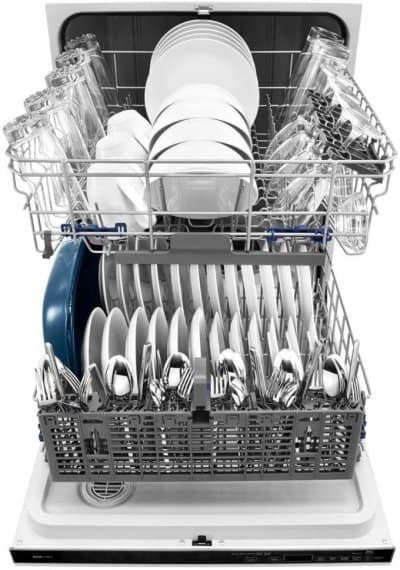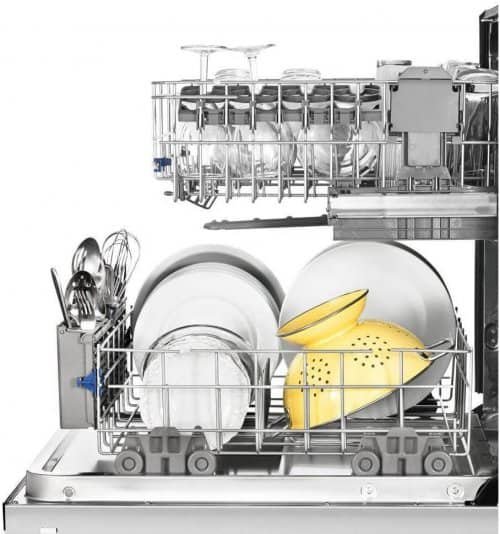In today’s fast-paced world, dishwashers have become an essential appliance in many households. They provide convenience and efficiency, making the daunting task of washing dishes a breeze. But have you ever wondered whether dishwashers use cold water or if hot water is required for optimal performance? In this article, we will delve into the fascinating world of dishwashers and explore the role of water temperature in achieving spotlessly clean dishes.
Table of Contents
How Dishwashers Work?
Before we discuss the temperature settings of dishwashers, let’s understand how these remarkable machines work. Dishwashers are designed to automate the process of cleaning dishes, utensils, and other kitchenware. They consist of several compartments, including a main wash chamber, a detergent dispenser, spray arms, and a heating element.
When you load your dirty dishes into the dishwasher and select a cleaning cycle, the machine begins its magic. First, water is pumped into the main wash chamber, and detergent is released from the dispenser. The spray arms rotate, directing water and detergent onto the dishes, effectively removing food particles and grime. Finally, the rinse cycle kicks in, ensuring any remaining detergent is washed away, leaving your dishes sparkling clean.
Temperature Settings in Dishwashers
Now that we have a basic understanding of how dishwashers work, let’s focus on temperature settings. Most modern dishwashers offer multiple temperature options, including hot, warm, and cold settings. The temperature selection determines the temperature of the water used throughout the cleaning cycle.
Hot water settings typically range from 120°F to 160°F (49°C to 71°C), warm settings range from 90°F to 110°F (32°C to 43°C), while cold settings use water at room temperature or slightly below. It’s important to note that the actual temperatures may vary depending on the dishwasher model and manufacturer.
Energy Efficiency of Dishwashers
One crucial aspect to consider when choosing a dishwasher temperature setting is energy efficiency. Heating water accounts for a significant portion of a dishwasher’s energy consumption. Hot water requires energy to heat it to the desired temperature, which can increase your energy bills over time.
Opting for cold water or lower temperature settings can help conserve energy and reduce your environmental impact. Cold water cycles require less energy, making them an attractive option for those seeking eco-friendly alternatives.
Benefits of Using Cold Water in Dishwashers
You might be wondering, why choose cold water for dishwashing? Well, using cold water in your dishwasher offers several benefits worth considering:
- Energy Savings: As mentioned earlier, cold water cycles consume less energy compared to hot water cycles, resulting in potential energy savings.
- Preservation of Delicate Items: Cold water is gentler on delicate dishes, such as fine china or glassware, reducing the risk of damage or breakage caused by thermal shock.
- Colorfastness of Utensils: Some utensils or plastics may be prone to discoloration or warping when exposed to hot water for extended periods. Cold water can help preserve the original color and integrity of these items.
- Quick Cleaning: Cold water cycles generally have shorter cleaning times, allowing you to run multiple dishwasher cycles efficiently and save time in your daily routine.
Effectiveness of Cold Water in Cleaning
One might question the effectiveness of cold water in cleaning dishes compared to hot water. While hot water has traditionally been associated with superior cleaning power, advancements in dishwasher technology have made cold water cleaning highly effective.
Modern dishwashers are equipped with powerful jets and sprays that ensure thorough cleaning even with cold water. Additionally, the detergents specifically formulated for dishwashers are designed to work effectively at various temperatures, including cold water settings. These detergents contain enzymes and surfactants that break down food particles and grease, providing excellent cleaning results regardless of the water temperature.
Washing Performance with Cold Water
Research and consumer reviews have shown that cold water dishwashing can achieve comparable cleaning performance to hot water cycles. The combination of efficient spray arms, specialized detergents, and longer cleaning durations compensates for the absence of high temperatures.
However, it’s worth noting that certain types of food residues, such as dried-on or baked-on stains, may require additional pre-soaking or targeted scrubbing before loading them into the dishwasher. Nevertheless, for everyday dishes with typical food residues, cold water cycles can effectively remove dirt and grime.
Hygiene and Bacteria Removal
One concern when using cold water for dishwashing is whether it effectively eliminates bacteria and ensures proper hygiene. Studies have shown that modern dishwashers, even when using cold water, reach temperatures high enough during the drying phase to kill most bacteria present on dishes.
Moreover, the combination of detergent, water pressure, and extended cleaning times in dishwashers helps remove bacteria effectively. It’s important to follow manufacturer guidelines for proper loading and detergent usage to optimize hygiene levels.
Pre-rinsing Dishes with Cold Water
To enhance the cleaning performance of cold water cycles, it’s advisable to pre-rinse dishes before loading them into the dishwasher. Pre-rinsing helps remove larger food particles and reduces the chances of clogging the dishwasher’s filters and spray arms. By pre-rinsing with cold water, you can conserve hot water and still achieve excellent cleaning results.
Comparison with Hot Water Washing
While cold water dishwashing offers numerous advantages, it’s important to consider situations where hot water washing may still be beneficial. Certain circumstances may require the use of hot water, such as:
- Greasy or Oily Dishes: Hot water can help dissolve and remove stubborn grease or oil residues more effectively than cold water.
- Sanitization Needs: In environments where strict sanitation standards are necessary, such as in commercial kitchens or healthcare facilities, hot water cycles may be preferred to ensure thorough sterilization.
- Heavy Soiling: For heavily soiled dishes or items with tough stains, hot water can provide an extra boost in cleaning power.
Environmental Impact of Hot Water Washing
While hot water washing may have its merits in specific situations, it’s important to consider the environmental impact. Heating water requires energy, usually derived from fossil fuels, which contribute to greenhouse gas emissions and climate change.
By opting for cold water or lower temperature settings in your dishwasher, you can reduce your carbon footprint and contribute to a more sustainable future. It’s a small but meaningful step towards conserving energy and protecting the environment.

Tips for Optimal Dishwasher Performance
To ensure optimal performance and maximize the benefits of cold water dishwashing, here are some tips to keep in mind:
- Proper Loading: Follow the dishwasher’s loading instructions to allow efficient water circulation and thorough cleaning.
- Use the Right Detergent: Choose a dishwasher detergent specifically formulated for cold water cycles to achieve the best results.
- Regular Maintenance: Clean the dishwasher filters and spray arms regularly to prevent clogs and maintain optimal performance.
- Water Temperature Adjustment: If your dishwasher allows, adjust the temperature setting based on the level of soiling and the type of dishes being washed.
- Skip Pre-rinsing for Light Soiling: For lightly soiled dishes, you can skip the pre-rinsing step to conserve water and still achieve satisfactory cleaning results.
- Load Similar Items Together: Group similar items together in the dishwasher to ensure even cleaning and efficient water distribution.
- Avoid Overloading: Overloading the dishwasher can hinder proper water circulation and lead to subpar cleaning results. Follow the recommended loading capacity for your specific dishwasher model.
- Regular Descaling: Periodically descale your dishwasher to remove mineral deposits and ensure optimal performance. Consult your dishwasher’s manual for specific descaling instructions.
By implementing these tips, you can enhance the effectiveness of cold water dishwashing and enjoy the benefits it offers.
Is cold water as effective as hot water in killing bacteria?
Yes, modern dishwashers, even when using cold water, reach high enough temperatures during the drying phase to eliminate most bacteria on dishes.
Can I use cold water for greasy dishes?
While cold water can effectively clean most dishes, hot water may be more effective in dissolving and removing stubborn grease or oil residues.
Does using cold water in my dishwasher save energy?
Yes, cold water or lower temperature settings consume less energy compared to hot water cycles, resulting in potential energy savings.
Do I need to pre-rinse dishes before loading them into the dishwasher with cold water?
Pre-rinsing dishes with cold water can help remove larger food particles and enhance cleaning performance, but it’s not always necessary for lightly soiled dishes.
How can I ensure optimal performance with cold water dishwashing?
Follow proper loading techniques, use the right detergent for cold water cycles, and regularly maintain your dishwasher to ensure optimal performance.
Conclusion
In conclusion, dishwashers have revolutionized the way we clean our dishes, making the task more convenient and time-efficient. While hot water has long been associated with dishwashing, cold water cycles have gained prominence due to their energy-saving benefits and comparable cleaning performance.
Modern dishwashers, combined with specialized detergents and advanced cleaning technologies, can effectively clean dishes using cold water. By opting for cold water or lower temperature settings, you can save energy, preserve delicate items, and minimize environmental impact without compromising on cleanliness.
However, it’s important to consider specific circumstances where hot water washing may still be necessary, such as heavy soiling or stringent sanitation requirements.
In the end, the choice between cold water and hot water dishwashing depends on your priorities, the level of soiling, and the type of dishes being cleaned. With proper loading, detergent selection, and maintenance, you can optimize the performance of your dishwasher and achieve sparkling clean dishes while embracing eco-friendly practices.

